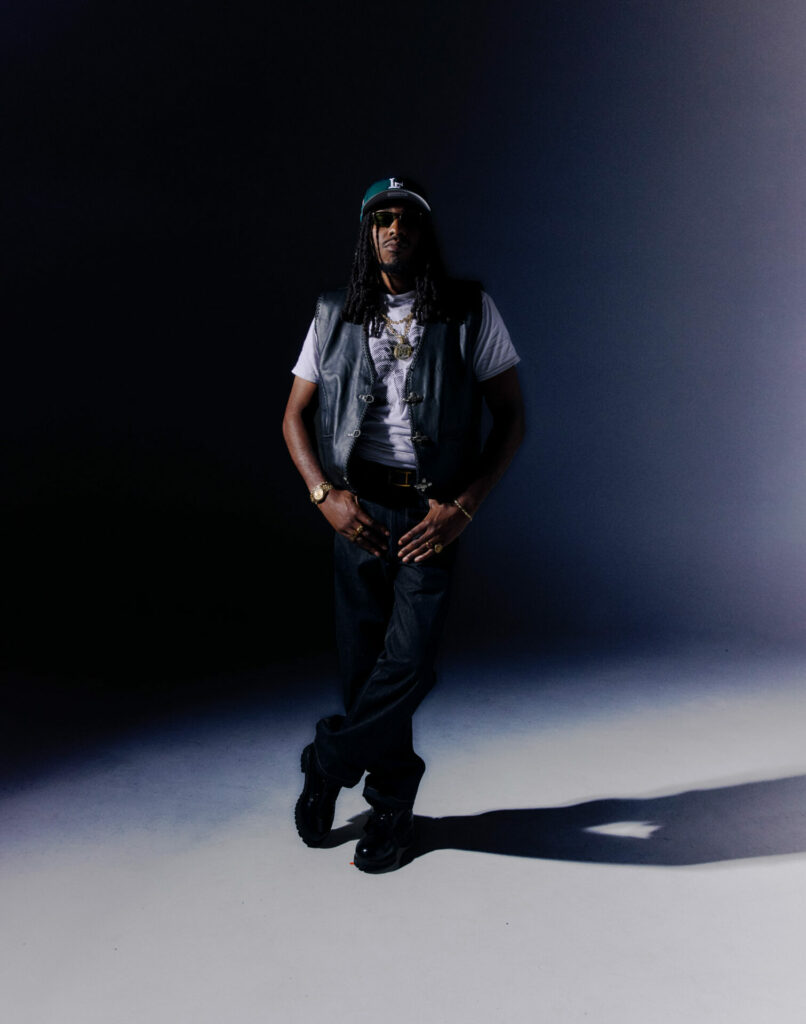On Home Ground: Knucks
After charting at number three with his sharp, London-centred debut album Alpha Place, Kilburn rapper Knucks has expanded his vision for second record A Fine African Man, to explore his ancestral home of Nigeria

The blockbuster music video for Knucks’ recent single ‘Goldtooth’ sums up the vision behind the north-west London rapper’s second studio album, A Fine African Man, due for release on 31 October. Flashing with gold jewellery, decadent club scenes, glamorous women and high-speed chases – brought to life by esteemed Nigerian filmmaker Director K – the highly cinematic Bond-themed film focuses on “showing Nigeria is a beautiful place”, according to Ashley Afamefuna Nwachukwu (aka Knucks).
After being sent away from London by his parents due to bad behaviour, the rapper spent a year living with extended family members in Enugu, Nigeria, between the ages of 11 and 12. Since then, the give-and-take relationship between Knucks, now 30 years old, and his ancestral home has continued to develop. In the past, he’s touched on those connections in certain lyrics and skits like ‘Bayteze Marriage Counselling’ (which featured on his debut 2019 EP NRG 105) and ‘Enugu’ (part of 2020 follow-up London Class). But A Fine African Man – with its proud title that abbreviates to Nwachukwu’s shortened Igbo name ‘Afam’ – is dedicated to documenting that relationship in greater depth than ever.
“When I was there originally, I was a meek little boy,” he reflects, before discussing the ‘Goldtooth’ video. “But filming that video, I had a big crew working for me. There was a guy whose job was literally to show up behind me with a chair any time I was standing too long: it was a mad juxtaposition! That’s what this project symbolises: how different I’m now being seen because of all the work I’ve put in. It felt good to be somebody that people looked to like, ‘He’s representing us over there.’ I was proud to be coming back and giving work to my people.”
It’s been a long journey. After growing up in north-west London, spraying bars on his estate with mates and looking up to grime heroes like Ghetts and Wiley (as well as heavyweight US lyricists like Nas and MF Doom), Knucks released debut mixtape Killmatic in 2014. Having showcased his impressive storytelling skills, he started gaining serious plaudits outside his pocket of London when he landed on a smooth, jazz-flecked style of UK drill, developed in the late 2010s on tracks like ‘Vows’ and ‘Home’, alongside young saxophonist Venna, a longtime collaborator.
“I made a sound that didn’t really exist, and to staple it, I had to make a project that solidified what I’d brought to the table,” recalls Knucks, sitting down with Rolling Stone UK in a plush scarlet studio space in north London. When the door swings open, he’s hunched over a piano, locks hanging beneath a red Supreme cap, and a gold ring on one finger emblazoned with the tagline “NoDaysOff”, Knucks’ record label and merch outlet. “Alpha Place was that project,” he says, referring to his 2022 debut album.
While tracks like ‘Vows’, ‘Home’ and ‘Standout’ (featuring Loyle Carner) had blended jazzy horns with elements of hip-hop and drill production, and EPs NRG 105 and London Class established a smooth, laid-back rapping style, Knucks’ debut album rubber-stamped the recipe that helped him break through: skippy hi-hat triplets, warm saxophone sequences and nuanced, intricately woven tales from the Alpha House estate in London’s south Kilburn.

It was a huge success: Knucks’ dedicated fanbase helped catapult Alpha Place to number three on the official UK charts, which, as an independently released debut record (dropped via NoDaysOff), is a serious achievement. The cohesiveness of the project – which uses skits, field recordings and clever lyricism with a razor-sharp understanding of when to withhold pieces of narrative and when to swing them like an axe – is key to that success. Alpha Place potently marked the story so far, but once it was out in the world, Knucks wanted to move on.
“I wasn’t gonna fall into the trap of realising people liked me for one thing and leaning all the way into that and forgetting my identity before that,” he explains. “I knew I was gonna make a conscious effort to make the next project sound different. I needed to make something that has a different theme, with African influences, so people know ‘OK, he does sonic concepts,’ an overarching story that gives a theme, an experience rather than just listening to songs.”
To guide the process, he listened to old Nigerian and Ghanaian music, “looking to find the patterns” that would allow him to create an authentic sound that combined UK and Nigerian flavours. “I feel like each genre has rules or patterns that make the genre the genre,” he explains. “With drill, I found out what the rules were and used the hats, certain snares, a certain tempo… Now I know [the rules], I know how to adapt my style to it. [For A Fine African Man], I listened to a lot of current Afrobeats, just to understand vocally what I wanted from features, and what makes people think, ‘This is a sick Afrobeats song.’”
To sculpt this sound, he employed trusted producers like Beat Butcha, a close friend based in Los Angeles, who’s known for making original samples from scratch for use in other people’s tunes. This process helped create the hypnotising string loop that runs through album opener ‘Masquerade’. He also brought in renowned UK producers like Emil, Swindle and TSB, with the latter pair flying out to Jamaica for an inspiring period spent recording at GeeJam Studios in Portland. “It puts you in a different space just being in a hot country, where at night the environment has a life of its own,” says Knucks.
A Fine African Man’s sonic landscape marks a significant change from Alpha Place, but in terms of narrative, there’s a firm sense of continuity. Knucks points to his debut album’s de facto closer ‘Three Musketeers’, which pays tribute to the rapper’s dynamic trio of childhood friends and their reconnection.
Referring to the song’s lyric, “I wouldn’t ever have up and left if there wasn’t a reason to,” he says, “I’m talking specifically about my experience of going back to Nigeria. The friends that I had before I left, when I came back, they weren’t living in my area anymore,” he explains.
“I see this as me now directly addressing that and covering that part of my life, and giving people more context [as] to how they got the last album. Being in Nigeria was the first time I really listened to myself think and thought about things before I did or said them. When I came back, I was a lot more mature.”

It makes sense, then, that when putting together the album and its accompanying videos, Knucks was committed to giving back to the place that helped shape this more mature persona by working closely with Nigerian creatives. Rappers like Blaqbonez and Phyno feature on the record, while Director K’s cast of creatives included a wide range of Nigeria-based photographers, art directors, stylists and makeup artists.
This is part of a broader mission to reframe the country, subverting and countering ignorant European narratives about Africa. “When I was younger, we weren’t proud of where we were from because it was always depicted as the Oxfam adverts: kids with big bellies and flies on their faces – that’s how people saw Africa and Nigeria,” he explains. “Showing it in a different light is important.”
Central to that process of celebrating roots and finding pride in identity is Knucks’ embrace of his Nigerian name. ‘My Name Is My Name’ sees him explore the sense of shame he used to associate with his name, reckoning with his own identity in lines like “Was in the back of the lecture room getting my name wrong / Feeling like A-A-Ron / Now I’m indoors with a bunch of awards with my long-arse African name on.”
Laced with a typical sense of humour but conveying a serious message about the journey he’s embarked on over the years, it’s lyrics like these that show why Knucks has built a reputation as one of UK rap’s most immersive storytellers. He excels when it comes to painting vivid portraits of human connection, whether it’s smoothly sketching out late-night liaisons with women or burrowing deeper into stories of generational exchange and grief.
‘Yam Porridge’ (featuring Tiwa Savage) uses comforting, homely food as a lens through which to explore these latter themes. “Food is like music; it marks a point in time. If you listen to a song lots when you’re going through an experience, when that song comes on, the feelings, memories and experiences come back up,” reflects Knucks. Meanwhile, a track like ‘My Name Is My Name’ directs listeners’ attention to an even more personal space.

“Even though I try to be like an open book in my music, I’m not the type of person to put too much of my personal stuff out there,” he admits. “But I thought, ‘If I’m gonna do this, I have to put my whole self in it.’ Funnily enough, my Nigerian name is Afamefuna, which means ‘my name will never go away’ or ‘my name will never be forgotten.’ But the first bit of my name literally translates to ‘my name’, so when I introduced myself at boarding school, I’d say ‘Afam bu Afam.’ So the English translation is literally ‘My name is my name.’”
It’s these layers of meaning, subtly obscured to many until you dig a little deeper, that make A Fine African Man a special project. While Alpha House was a sharp, targeted portrayal of an insular world, grounded in the cold, drizzly realities of a London housing estate, the scope of Knucks’ second album is expanded massively. It encompasses multiple cultural identities, complex family histories and personal narratives. While there’s an understated quality to his expression, Knucks is clearly aware of this lofty ambition – and the fact that it’s lacking in some quarters of the UK rap scene.
“I feel like UK rap is in a weird place,” he says. “We’re very braggadocious in our music, and it’s very hard for people to soften their hearts for someone who’s bragging and boasting. But if you’re on a more humble and relatable vibe, where you’re just telling your honest truth, you’ll reach out to people’s human nature, and they’ll see where you’re coming from. That’s why I made ‘Home’: to show an alternative perspective, to put a story behind the mugshots you’re always seeing.
“A lot of artists make music based on what they think people wanna hear; they’ll lean their music towards what seems to be popping,” he continues. “But if it seems like nothing is really popping, it’s kinda confusing for artists, and when something blows, a lot of people will just jump on it… There’s not that much creativity or risk-taking. But hey, that just makes it easier for someone like me who’s trying to take risks and be creative.”
In order to help try to develop an imaginative generation of new artists, Knucks wants to create a team of innovative producers working under his NoDaysOff umbrella. “There’s a whole generation of sick young producers with their own way of doing things, like Kare, who produced ‘Nkita’,” he says. “These guys are the future. I wanna use my platform to help them, put them in the right spaces, and build the brand by finding people who are as hungry as I was at their age.”
That hunger – just like the pride he now has in his name, and the humility and gratitude that came from spending time washing his own clothes and living without comforts that are taken for granted in the UK, as explored in ‘Cut Knuckles’ – can be traced back to Knucks’ year in Nigeria. At its core, A Fine African Man is an attempt to pay homage to that formative time.
“Learning how to live without the privileges we have here gave me a solid foundation, a sense of pride in the culture, and in doing things for myself,” he says. “Without any of the possessions that I’ve got since I started to get money, I was already blessed just to be here. When I deep it, I’m proud of what we’ve done, and I think this project is a good reflection of my home and my people.”
